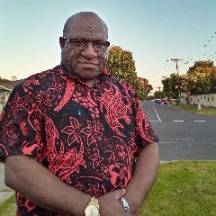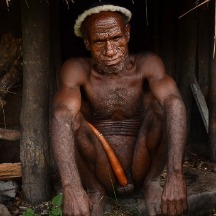Though there is a ten-hour time difference between Bissau, Guinea-Bissau, Africa and Jayapura, West Papua on the island of New Guinea in Oceania, their historical relationship with European colonialism binds them beyond the shared skin tones and hair textures of their indigenous people. Similar to their brethren “Guineans” in Africa and South America, the Guineans in Oceania also want their independence.
“We West Papuans have long been waiting for full independence such as other people in the world,” explained Port Of Harlem reader Pache Walsa Boda-Waris, who works with the Free West Papua Campaign and lives in Papua New Guinea. West Papua shares the island of New Guinea with Papua New Guinea, in Oceania, near Australia.
Reminiscent of the 1863 agreement between Europeans to peacefully carve up Africa for their own needs and without regard to the indigenous people, The Netherlands in 1898 colonized the western part of the island of New Guinea and called it West Papua. The eastern half of the island is now Papua New Guinea. Many European nations and their descendant nation, Australia, administered Papua New Guinea for many decades until it became an independent nation in 1975.
Like many Continental African families, Lewis Prai Wellip finds his family living on both sides of arbitrary borders set up by Europeans. “We have family members on one side of the border who speak English and some on the other side who speak Bahasa Indonesia.”
When Indonesia became independent in 1949, they wanted all of the former Dutch lands in Oceania including West Papua. However, the Dutch government recognized that West Papua was geographically, ethnically, and culturally very different to Indonesia and so the Dutch government began preparing West Papua for its own independence throughout the 1950s.
With The Cold War with the Russians in the background, Indonesia flirted with the Russians, causing angst with the United States. And, the Russian’s enemy, the United States, managed to engineer a meeting between Indonesia and the Netherlands resulting in the New York Agreement, which in 1962 gave control of West Papua to Indonesia, as Indonesia wished, instead of shepherding West Papua toward independence.
“We were recolonized,” explained Lewis Prai Wellip, whose uncle, Jacob Prai, helped developed the Free Papua Movement. On July 1, 1971, the Free Papua Movement declared independence from Indonesia; an independence not yet internationally recognized.
Prai now lives in exile in Sweden. Wellip has also left their native land, which reportedly contains the world’s largest gold deposit, with gold being a natural resource that has historically induced man to make inhuman decisions. “Gold played the key role regarding annexation of West Papua by Indonesia,” affirmed Wellip. Boda-Waris concurred with Wellip’s position and added that he believes it’s the “fundamental reason,” Indonesia lays claim to his country.
West Papuans in Oceania Seek Freedom Like Other African People
Features




In his Facebook interview with Port Of Harlem, Wellip said he was raised in a refugee camp in Papua New Guinea and like many Continental African families he finds his family living on both sides of arbitrary borders set up by Europeans. “We have family members on one side of the border who speak English and some on the other side who speak Bahasa Indonesia,” he explained.
Benny Wenda, who now lives in exile in the United Kingdom, escaped from custody while on trial in 2003. He founded the Free West Papua Campaign in 2004. He recalls growing up with Indonesian teachers and students calling him and other Papuans “stupid,” “primitive,” and “dirty” because they ate pork and their parents were ‘indecent’, with the men wearing nothing but the traditional koteka (penis gourd).
Many West Papuan freedom advocacy groups and others point to United Nations General Assembly Resolution 1514 as the bedrock for their cause and the UN’s Fourth Committee for action. The resolution affirmed the granting of independence to colonial countries and peoples; the Fourth Committee focuses on “special political and decolonization.” However, Prai Welp added, “The Dutch government has a moral responsibility and duty to fulfil their promise to the West Papuan people by completing the decolonization process which they started from the early 60's.”
In Africa, the historical colonies of French Guinea, Spanish Guinea, and Portuguese Guinea gained independence in that order and subsequently named themselves Guinea ( 1958, capital Conakry), Equatorial Guinea (1968, capital Malabo, and Guinea-Bissau (1973, capital Bissau). Even Ghana, the Black star republic, comprises what was called Danish Guinea (also Danish Gold Coast) and Swedish Guinea (Swedish Gold Coast) along with parts of German Guinea.
In South America, there is French Guiana, an overseas territory of France, Guyana (formerly British Guiana), and the former Dutch Guiana is now called Suriname.
In Oceania, there was also German New Guinea. It included what is now the Federated States of Micronesia.
Note: Papua New Guinea is a part of the Organisation of African, Caribbean and Pacific States
Benny Wenda, who now lives in exile in the United Kingdom, escaped from custody while on trial in 2003. He founded the Free West Papua Campaign in 2004. He recalls growing up with Indonesian teachers and students calling him and other Papuans “stupid,” “primitive,” and “dirty” because they ate pork and their parents were ‘indecent’, with the men wearing nothing but the traditional koteka (penis gourd).
Many West Papuan freedom advocacy groups and others point to United Nations General Assembly Resolution 1514 as the bedrock for their cause and the UN’s Fourth Committee for action. The resolution affirmed the granting of independence to colonial countries and peoples; the Fourth Committee focuses on “special political and decolonization.” However, Prai Welp added, “The Dutch government has a moral responsibility and duty to fulfil their promise to the West Papuan people by completing the decolonization process which they started from the early 60's.”
What’s Behind Guinea’s Name?
The racial overtones to Oceania’s history run deep. There are many countries using the name Guinea around the world. Some suggest it was the Portuguese who were the first Europeans who began to refer to the “Black” African peoples living south of the Senegal River as Guinea. A Spanish explorer who saw resemblance of the people in Papua New Guinea, which shares an island with West (Papua) Guinea, with those who he had seen along the Guinea coast in Africa led him to combine the local term for the island, Papua, with Guinea to produce what is now known as Papua New Guinea.In Africa, the historical colonies of French Guinea, Spanish Guinea, and Portuguese Guinea gained independence in that order and subsequently named themselves Guinea ( 1958, capital Conakry), Equatorial Guinea (1968, capital Malabo, and Guinea-Bissau (1973, capital Bissau). Even Ghana, the Black star republic, comprises what was called Danish Guinea (also Danish Gold Coast) and Swedish Guinea (Swedish Gold Coast) along with parts of German Guinea.
In South America, there is French Guiana, an overseas territory of France, Guyana (formerly British Guiana), and the former Dutch Guiana is now called Suriname.
In Oceania, there was also German New Guinea. It included what is now the Federated States of Micronesia.
Note: Papua New Guinea is a part of the Organisation of African, Caribbean and Pacific States
Advertisers | Contact Us | Events | Links | Media Kit | Our Company | Payments Pier
Press Room | Print Cover Stories Archives | Electronic Issues and Talk Radio Archives | Writer's Guidelines






